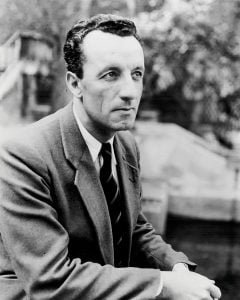Phenomenology of Perception by Merleau-Ponty

Phenomenology of Perception
Phenomenology of Perception (French: Phénoménologie de la perception) is a 1945 book by the French philosopher Maurice Merleau-Ponty, in which the author expounds his thesis of “the primacy of perception”. The work established Merleau-Ponty as the pre-eminent philosopher of the body, and is considered a major statement of French existentialism. The relationship between Phenomenology of Perception and Merleau-Ponty’s late, unfinished work has received much scholarly discussion. An English translation by Colin Smith was published in 1962; another English translation, by Donald Landes, was published in 2013.
Book Details
Author: Merleau-Ponty
Print Length: 569
Publisher: Routledge
Original source: http://alfa-omnia.com/resources/Phenomenology+of+Perception.pdf
Submitted by: Website Visitor
Book format: Pdf
Language: English
Book Download
Contents
Preface
INTRODUCTION
Traditional Prejudices and the Return to Phenomena
- 1 The ‘Sensation’ as a Unit of Experience
- 2 ‘Association’ and the ‘Projection of Memories’
- 3 ‘Attention’ and ‘Judgement’
- 4 The Phenomenal Field
PART I
The Body Experience and Objective Thought. The Problem of the Body
- 1 The Body as Object and Mechanistic Physiology
- 2 The Experience of the Body and Classical Psychology
- 3 The Spatiality of One’s own Body and Motility
- 4 The Synthesis of One’s own Body
- 5 The Body in its Sexual Being
- 6 The Body as Expression, and Speech
PART II
The World as Perceived. The Theory of the Body is already a Theory of Perception
- 1 Sense Experience
- 2 Space
- 3 The Thing and the Natural World
- 4 Other Selves and the Human World
PART III
Being-for-Itself and Being-in-the-World
- 1 The Cogito
- 2 Temporality
- 3 Freedom
Bibliography
Index
Sample
Phenomenology of Perception
1
THE ‘SENSATION’ AS A UNIT OF EXPERIENCE
At the outset of the study of perception, we find in language the notion of sensation, which seems immediate and obvious: I have a sensation of redness, of blueness, of hot or cold. It will, however, be seen that nothing could in fact be more confused, and that because they accepted it readily, traditional analyses missed the phenomenon of perception. I might in the first place understand by sensation the way in which I am affected and the experiencing of a state of myself. The greyness which, when I close my eyes, surrounds me, leaving no distance between me and it, the sounds that encroach on my drowsiness and hum ‘in my head’ perhaps give some indication of what pure sensation might be.
I might be said to have sense-experience (sentir) precisely to the extent that I coincide with the sensed, that the latter ceases to have any place in the objective world, and that it signifies nothing for me. This entails recognizing that sensation should be sought on the hither side of any qualified content, since red and blue, in order to be distinguishable as two colours, must already form some picture before me, even though no precise place be assigned to them, and thus cease to be part of myself. Pute sensation will be the experience of an undifferentiated, instantaneous, dotlike impact.
About Author: Merleau-Ponty
 Maurice Jean Jacques Merleau-Ponty (1908–1961), French philosopher and public intellectual, was the leading academic proponent of existentialism and phenomenology in post-war France. Best known for his original and influential work on embodiment, perception, and ontology, he also made important contributions to the philosophy of art, history, language, nature, and politics. Associated in his early years with the existentialist movement through his friendship with Jean-Paul Sartre and Simone de Beauvoir, Merleau-Ponty played a central role in the dissemination of phenomenology, which he sought to integrate with Gestalt psychology, psychoanalysis, Marxism, and Saussurian linguistics. Major influences on his thinking include Henri Bergson, Edmund Husserl, Martin Heidegger, Max Scheler, and Jean-Paul Sartre, as well as neurologist Kurt Goldstein, Gestalt theorists such as Wolfgang Köhler and Kurt Koffka, and literary figures including Marcel Proust, Paul Claudel, and Paul Valéry. In turn, he influenced the post-structuralist generation of French thinkers who succeeded him, including Michel Foucault, Gilles Deleuze, and Jacques Derrida, whose similarities with and debt to the later Merleau-Ponty have often been underestimated.
Maurice Jean Jacques Merleau-Ponty (1908–1961), French philosopher and public intellectual, was the leading academic proponent of existentialism and phenomenology in post-war France. Best known for his original and influential work on embodiment, perception, and ontology, he also made important contributions to the philosophy of art, history, language, nature, and politics. Associated in his early years with the existentialist movement through his friendship with Jean-Paul Sartre and Simone de Beauvoir, Merleau-Ponty played a central role in the dissemination of phenomenology, which he sought to integrate with Gestalt psychology, psychoanalysis, Marxism, and Saussurian linguistics. Major influences on his thinking include Henri Bergson, Edmund Husserl, Martin Heidegger, Max Scheler, and Jean-Paul Sartre, as well as neurologist Kurt Goldstein, Gestalt theorists such as Wolfgang Köhler and Kurt Koffka, and literary figures including Marcel Proust, Paul Claudel, and Paul Valéry. In turn, he influenced the post-structuralist generation of French thinkers who succeeded him, including Michel Foucault, Gilles Deleuze, and Jacques Derrida, whose similarities with and debt to the later Merleau-Ponty have often been underestimated.

Leave a Reply
Want to join the discussion?Feel free to contribute!